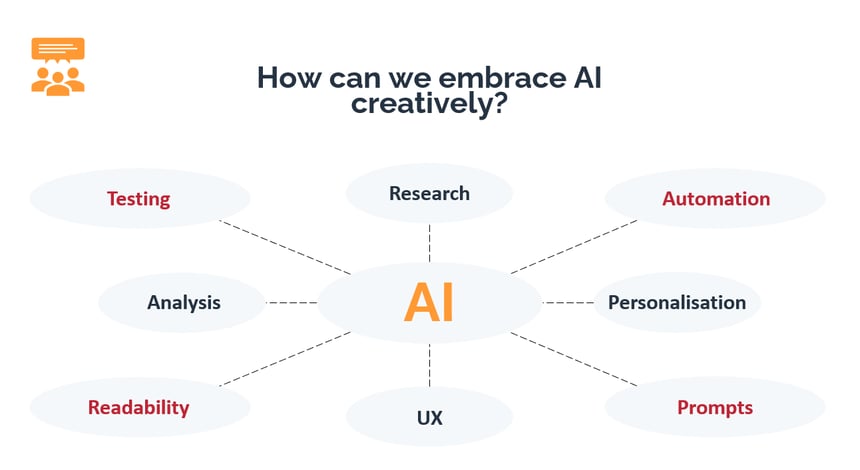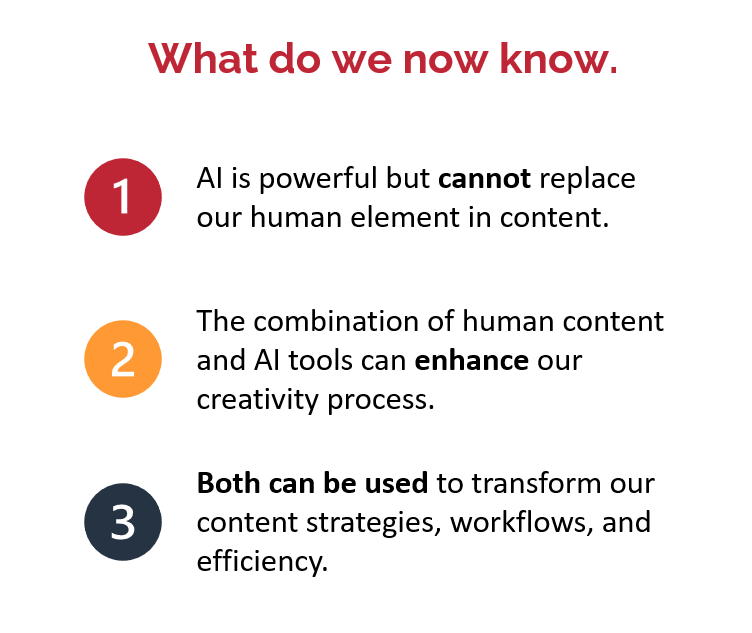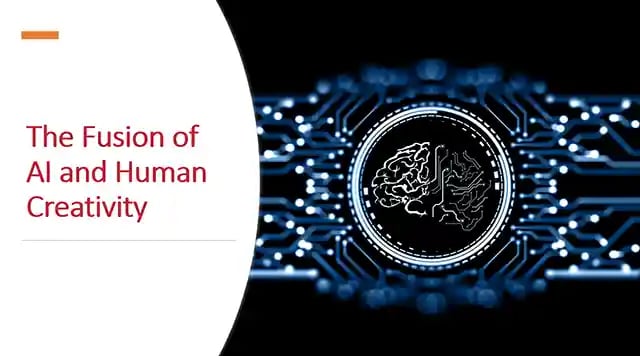Human Content in an AI World: A Balance for Success
- Home
- Human Content in an AI World: A Balance for Success
Remember when human hands were behind every piece of content we consumed? Back then, a writer's unique voice echoed through each word, resonating with readers emotionally. Now, Human Content in an Artificial Intelligence World is becoming increasingly elusive. The content writing industry has changed.
In today's fast-paced digital economy, businesses use artificially intelligent tools for help. These tools churn out vast amounts of content at breakneck speed, but can they replace the authenticity that only comes from human intelligence?
We're standing at the crossroads between efficiency and emotionality; navigating this landscape is no easy feat. Where do we draw the line as our daily lives become increasingly intertwined with technology?
This journey will explore how critical thinking abilities inherent to humans play a crucial role in tackling complex issues that AI might struggle with.
I'd be delighted to have you join me. I'm eagerly anticipating your involvement and extending an invitation to all.
Table Of Contents:
- The Rising Influence of AI in Business
- The Human Element in an AI World
- The Importance of Human Content in Building Trust
- The Limitations of AI-Generated Content
- FAQs about Human Content in an AI World
- Conclusion
Ref: Download the full slide deck here.
The Rising Influence of AI in Business
Artificial Intelligence (AI) is no longer a thing of the future. It's here, reshaping businesses and boosting efficiency at an impressive rate. With 80% of companies believing that AI will significantly impact their industry, it’s clear that its influence can't be ignored.
AI's Role in the Digital Economy
A key area where AI is making waves is within the digital economy. This isn't surprising given how integral technology has become to our daily lives. What implications does this have for businesses?
To start with, let's consider generative AI - one aspect of machine learning which allows computers to create new content based on existing data patterns. Generative AI has shown immense potential for tasks such as generating images or writing text, automating processes previously performed by humans.
This transformation also extends to marketing tools utilized by businesses today: from leveraging AI-driven speech recognition software for customer service interactions to employing ai writing tools for more efficient content creation.
Leveraging Artificial Intelligence
If we look closely at these examples, we see two important themes emerging – productivity and quality control. Productivity because machines can work around the clock without fatigue or breaks; quality control because, unlike human beings who may have varying performance levels due to factors like mood or health conditions, machines are consistent performers provided they're programmed correctly.
Implications For Businesses
75% of businesses are already using AI in some form. The reason? Businesses integrating AI can analyze large datasets to make smarter decisions, which leads to enhanced performance and profitability.
AI tools can not only boost a company's profits but also create an expansive impact on the digital economy as a whole. It's estimated that by 2030, AI could contribute up to $15 Trillion.
AI is here, shaking up businesses and supercharging efficiency. From generative AI creating new content to marketing tools using speech recognition software - it's all about productivity and quality control. Businesses harnessing AI get to analyze tons of data for smarter decisions that lead to better results.
The Human Element in an AI World
Despite the immense potential of artificially intelligent systems, 63% of consumers prefer human interaction over AI. That's because there are key points that humans bring to content creation which cannot be replicated by even the most advanced algorithms.
The Power of Human Emotion and Creativity
In this era where natural language processing is used to produce content or even generate images, it’s crucial not to overlook one major issue - the power of human emotion and creativity. Humans have a knack for adding a personal touch into their work which can't quite be mimicked by generated AI.
A human writer understands how emotional intelligence plays into writing tools like metaphor, humour, and storytelling; elements that are beyond current AI capabilities. For instance, if you've ever laughed at a blog post or felt moved by a brand story on social media platforms- those were likely crafted with the nuance only possible through a deep understanding provided by human intellect.
An MIT initiative called 'Project Whitehat' has expressed concerns about this very topic stating that "AI still struggles when tasks require common sense reasoning or broad world knowledge." These findings underline why vast amounts (85%, according to statistics) of consumers trust companies more when they use content created by fellow humans rather than machines. [1]
The Importance of Human Intelligence in Critical Thinking
Another critical advantage offered uniquely by our species is complex problem-solving ability: Critical thinking powered not just by logic but also empathy and ethical considerations—a skillset as yet unmatched in artificial counterparts.
This becomes especially important while tackling complex issues requiring context-specific knowledge workers often possess due to firsthand experience—a feature Elon Musk acknowledges is essential for future AI. But even he agrees that we are far from seeing an AI with a human-like understanding of the world. [2]
So, while search engine rankings may show content generated by AI at times, it’s important to remember that content quality is not just about grammar and vocabulary. It involves weaving narratives together in ways only humans can.
AI has made considerable progress in numerous facets of our lives. From speech recognition to image generation, AI continues to transform the world around us.
Despite AI's vast potential, it can't replace the human touch in content creation. The power of human emotion and creativity breathes life into writing through humour, storytelling, and metaphor—elements beyond current AI capabilities. Moreover, humans' complex problem-solving ability shaped by empathy and ethical considerations outshines any artificial counterpart. So remember: quality content isn’t just about SEO keywords or technical accuracy—it’s also about engaging readers with genuine emotion, compelling narratives and a clear understanding of their needs.
The Importance of Human Content in Building Trust
Building trust with the customer base is a crucial aspect of any business and human content from genuine content creators plays an instrumental role in this. With 90% of businesses believing that human content is essential for building trust, the importance cannot be overstated.
Human Content and Customer Loyalty

A brand story doesn't just sell products; it builds relationships. Inviting your audience into your world through blog posts or social media can create a meaningful connection with them, just like having an intimate conversation over coffee. It's like having a conversation over coffee - personal and real.
Your marketing department might struggle with writer's block at times, but there’s something about engaging content created by humans that connects deeply with people. 60% of businesses have seen an increase in customer loyalty through the use of such authentic material.
This isn’t surprising considering we all yearn for genuine connections even when dealing with brands. And nothing feels more authentic than knowing there are actual people behind those fascinating articles on their blog posts or witty captions on their Instagram feeds.
Half the battle won lies not just in producing quality content but in ensuring its relevance to the reader as well. # AI writing may help generate large amounts of text quickly but lacks this key ability to tailor messages based on individual user interests or current events – areas where human writers excel naturally due to our inherent emotional intelligence.
| Key Stats: The Impact Of Human Content On Business Success | |
|---|---|
| Customer Loyalty Through The Use Of Human-Generated Content | |
| Total Businesses That Believe In The Power Of Human-Generated Content | 90% |
| Total Businesses That Plan To Increase Investment In Human Content | 50% |
| Total Businesses That Saw An Increase in Customer Loyalty With Human Content | 60% |
AI's rise has sparked a revolution, enabling the rapid generation of vast amounts of text. It's truly an exciting era.
Human content is a powerhouse for building trust and loyalty. 90% of businesses recognize its importance in creating authentic connections with customers. Despite AI's growing influence, it can't replicate the emotional intelligence human writers bring to crafting engaging, relevant material. It’s clear - investing in human-generated content pays off.
The Limitations of AI-Generated Content

AI's ability to generate content is impressive, but it's not without its flaws. Let's explore some of the limitations.
Lack of Personalization and Understanding
AI can produce vast amounts of content writing quickly, but when it comes to personalizing that content for a target audience or understanding complex issues, AI falls short. It lacks the human intelligence required for critical thinking and emotional resonance.
A study by the MIT Initiative on the Digital Economy found that 70% of consumers are less engaged with AI-generated content because they perceive it as impersonal. Despite advances in NLP and speech recognition, AI still cannot match the creative adaptability of humans. no matter how sophisticated an artificially intelligent system might be, it still cannot fully grasp nuances in tone or context as a human brain can.
Inability to Creatively Adapt
An integral part of writing involves creativity - adapting style according to topic or audience needs; unfortunately, this isn't something generated AI excels at yet. While machines can use algorithms to produce text based on data inputs, they lack creative flexibility which limits their effectiveness, especially in more artistic endeavours such as storytelling or poetry where subtlety and nuance are key points for success.
A Stanford research project called Deep Artificial Composer (DAC) demonstrated this limitation. DAC was able to create melodies from musical patterns but struggled immensely when asked to develop unique compositions reflecting certain moods – essentially highlighting another aspect where human touch outshines machine efficiency.
Questionable Trustworthiness
A lack of trust is another limitation. In an era where misinformation spreads like wildfire, credibility becomes a significant factor for readers when consuming content. This is especially important as AI has no real-world experiences or emotions to draw from and therefore can't fully connect with its audience on an emotional level.
Pew Research found that 73% of adults in America expressed concerns about machines making decisions involving human lives without any human review. Elon Musk himself has frequently voiced his reservations about AI's potential impact on our daily lives if not regulated properly – clearly indicating the need for caution and human oversight.
AI-generated content, while impressive in volume and speed, lacks the human touch. It falls short on personalization and understanding complex issues, struggling to grasp nuances like humans do. AI also has limited creative flexibility and is less trusted due to its inability to connect emotionally with readers or produce credible information without human oversight.
FAQs about Human Content in an AI World
What will humans do in an AI world?
In the AI era, folks' jobs won't disappear but morph. We'll still be critical for creativity, empathy, and decision-making that needs a human touch.
What is the difference between AI content and human content?
AI-generated stuff can crunch out bulk data swiftly but lacks personal nuance. Human content carries emotion and a unique perspective that machines just don't get.
How do you humanize AI content?
To give your AI material a more humane vibe, mix it with natural language processing techniques. Add colloquial expressions or pop culture references to hit home with readers.
What is the role of humans in AI?
We create and train these brainy bots. Folks monitor their progress to make sure they're on track, tweak them when needed and keep ethical use in check too.
Conclusion

The rise of AI technology in business is undeniable. It's rapid, it's competent and sure enough, it can create material at a rate we people can just fantasize about.
But there’s something about human creativity that keeps us relevant. That emotionality you feel when reading an impactful piece? The empathy stirred by compelling storytelling? That's the magic touch only humans bring to the table.
So where do we stand in this world of Human Content in an AI World?
We strike a balance - leveraging AI for efficiency while retaining our unique human element. We use tech to streamline processes but keep critical thinking within our hands because no one understands complex issues as we do.
Remember this: your audience craves connection; they yearn for authenticity – two things even the most advanced AI cannot fully replicate... yet!


